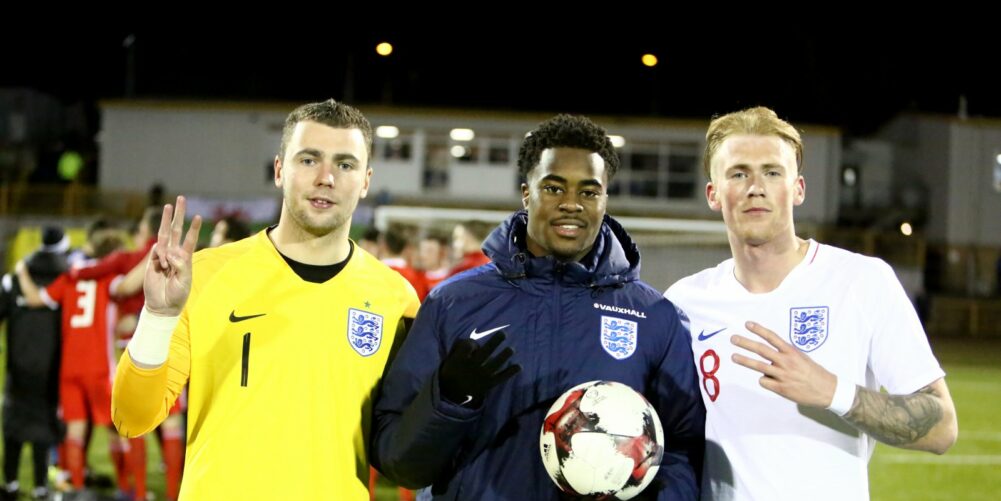Grant Smith, Fejiri Okenabirhie and Mitch Pinnock now play in the Football League for Lincoln, Shrewsbury and AFC Wimbledon respectively. Picture: Alun Roberts
The enclosed press box at Galway United’s Eamonn Deacy Park was one of the times to be grateful of being sheltered from the elements.
Despite it being a Bank Holiday weekend in May in Ireland, the rain was lashing down as the wind whipped around.
A poor member of the groundstaff provided much amusement to the assembled, dry and warm, hacks as he had several unsuccessful attempts at putting the corner flag in before it was blown over again.
But it was more memorable for the game. Not least a 2-1 win for England C over a strong Republic of Ireland U21 side, but also for the question mark that was hanging over Non-League‘s international set-up.
With cost-cutting at The FA being driven by chairman Greg Dyke, England C found itself as a number on a balance sheet.
The swingeing cuts across the organisation meant our Three Lions were under threat. While a win didn’t mean the team was saved, it was pretty obvious how much the victory did mean to Paul Fairclough and his management team, as well as The FA staff who poured hours of time – and passion – into the C set-up over the years.
At that point, in Fairclough’s 11 years in charge, 205 capped players had gone on to play in the Football League or Scottish Premier League be it through promotion with their club or transfer, with some even reaching the pinnacle of the Premier League.
Fairclough has always described England C as a finishing school. A rubber stamp, if you like, on the young English talents in Non-League football who have been moulded and nurtured at their clubs to earn their trade higher.
But even though the budget was a fraction of the senior side’s, all that was on the line and up for debate in the coming weeks.
Sitting in the England C hotel interviewing Fairclough after the game, it was tempting to wonder if it was the last game we’d cover.
The former Stevenage and Barnet boss – and the FA – has always been fantastic with the access he gives this paper, allowing us to sit in on meetings and get a real insight into what the set-up is all about.
A few weeks later a call came through. Plenty of hard work behind the scenes, the testimonies from former players who had gone on to bigger things – Steve Morison, Lee Johnson, David Stockdale – had helped an impassioned plea to keep the team going and a stay of execution was handed down.
Of that 16-man squad, 12 have since played in the Football League. Sean Raggett, Louis Moult and Jordan Roberts are all at Championship clubs. Matty Pearson is at a Luton side looking good to be in that division next season, James Bolton scored against Stoke City recently for Shrewsbury and Alex Woodyard is captain of Peterborough United.
Including those 12, in the nine squads Fairclough has worked with since, 60 have played in the EFL or SPL. SIXTY in three-and-a-half years, which takes the tally under Fairclough, since 2003, to 265.
Of those players, ten have played in the Championship including defenders Angus MacDonald, Barnsley and Hull, Birmingham City’s Marc Roberts, Reading’s Andy Yiadom, former Solihull Moors striker Omar Bogle and Ipswich Town’s Kayden Jackson.
Jamal Lowe is currently starring at Portsmouth, James Norwood is the top scorer in League Two, Ethan Pinnock showing his class at Barnsley and Dapo Afolayan was signed by Premier League West Ham United.
It’s a remarkable stat and one Non-League football should be hugely proud of. The FA, too, deserve credit for realising what a gem they have on their hands and keeping it going.
Previously the International Challenge Trophy has provided the bulk of England C’s games through a season. It was a UEFA competition that allowed countries to give their U23s competitive games and England C was this country’s representation. A regular in the finals, some of the results over the years have been fantastic often against players at top European clubs.
With more U23 tournaments now around, the ICT has fallen by the wayside in some ways – not that it won’t ever come back – and England C’s remit has perhaps shifted to being one of a much more ambassadorial nature. The result still matters when the jersey is pulled on.
If you ask those players who have progressed on in their careers how much they took from playing from England C, the response would be universally positive.
Hopefully the fans turn out for the upcoming game in March with Wales at Salford City and there’s an Estonia fixture in June that provides a perfect weekend getaway excuse.
Who knows, one day a game at Wembley? It would be fitting for the team to be recognised on the best stage in this country. Perhaps a third instalment on Non-League Finals Day.
Whatever happens down the line, the team deserves more plaudits and more recognition. The opportunity it gives young footballers to represent their country is fantastic. Having covered the team for nearly ten years, the one constant is the pride you see in the players and their families.
Telling their stories in these pages is a privilege. There were 60 almost unwritten. Thankfully we were able to tell them. Here’s to the next tales.






















